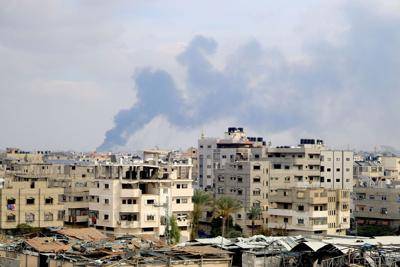Hamas hands over first Israeli hostages as Gaza truce begins

Stay tuned with 24 News HD Android App

The first three Israeli hostages returning home under a long-awaited Gaza truce were transferred to the Red Cross on Sunday, a Hamas official and the Israeli military said.
The hostages, all women, "were officially handed over to the Red Cross" in Gaza City ahead of their return to Israel, the senior Hamas official told AFP.
It came hours after the ceasefire between Israel and Hamas took effect in the morning, nearly three hours later than scheduled, after more than 15 months of war.
During the delay, Israel's military said it was continuing to operate, with the territory's civil defence agency reporting 19 people killed and 25 wounded in bombardments.
Minutes after the truce began, the United Nations said the first trucks carrying sorely needed humanitarian aid had entered the Palestinian territory, as displaced, war-weary Palestinians set off across the devastated Gaza Strip to return to their home areas.
Thousands of people carrying tents, clothes and their personal belongings were seen going home, after the war that displaced the vast majority of Gaza's population, in many cases more than once.
In the northern area of Jabalia, hundreds streamed down a sandy path, returning to an apocalyptic landscape piled with rubble and destroyed buildings.
"We are finally in our home. There is no home left, just rubble, but it's our home," said Rana Mohsen, 43, back in Jabalia.
Another returning resident, Walid Abu Jiab, said he had found "massive, unprecedented destruction", with "nothing left" in Gaza's war-battered north, which has seen intense violence over the past months.
In the southern city of Rafah, Ahmad al-Balawi said that "as soon as I returned... I felt a shock."
"Entire areas have been completely wiped out", he told AFP, describing "decomposing bodies, rubble, and destruction everywhere".
- 'Massive' aid effort -
Aid workers say northern Gaza is particularly hard-hit, lacking all essentials including food, shelter and water.
Jonathan Whittall, interim chief of the UN's OCHA humanitarian agency for the Palestinian territories, said on X that the first trucks started entering following the truce, after "a massive effort" to prepare for a surge of aid across the territory.
The truce had been scheduled to begin at 8:30 am (0630 GMT) but a last-minute dispute over the list of hostages to be freed on the first day led to the holdup.
Qatar, a mediator of the truce, later confirmed it had gone into effect.
The Hostage and Missing Families Forum campaign group identified the three women set to be released later on Sunday as Emily Damari, Romi Gonen and Doron Steinbrecher.
The Israeli military said that "the Red Cross has communicated that the three Israeli hostages were transferred to them and are on their way" to be taken by Israeli forces.
Hamas earlier said it was waiting for Israel to furnish "a list containing the names of 90 prisoners from the categories of women and children" also to be released on the first day.
A total of 33 Israeli hostages, 31 of whom taken by militants during Hamas's October 7, 2023 attack, will be returned from Gaza during an initial 42-day truce, in exchange for around 1,900 Palestinians in Israeli custody.
The truce is intended to pave the way for a permanent end to the war, but a second phase has yet to be finalised.
It follows a deal struck by Qatar, the United States and Egypt after months of negotiations.
In a televised address on Saturday, Netanyahu called the first phase a "temporary ceasefire" and said Israel had US support to return to the war if necessary.
In Gaza City, well before the ceasefire went into effect, people were already celebrating, waving Palestinian flags in the street.
The Israeli army warned Gaza residents early Sunday not to approach its forces or "the buffer zone" near Israeli territory "for your safety".
In Israel, the ceasefire was met with guarded optimism.
"I don't trust our side or their side," said taxi driver David Gutterman. "Always at the last moment something, a problem, can pop up, but all in all I'm really happy."
Shai Zaik, an employee at Tel Aviv's art museum, said he had "mixed feelings" but was "full of hope" that the hostages would return after so many disappointments in the last year."
Israel has prepared reception centres to provide medical treatment and counselling to the freed hostages before they return to their families. Health workers have warned of the psychological challenges the captives will face upon release.
- 600 trucks -
Egyptian Foreign Minister Badr Abdelatty said 600 trucks a day would enter Gaza after the ceasefire took effect, including 50 carrying fuel.
The war's only previous truce, for one week in November 2023, also saw the release of hostages held by militants in exchange for Palestinian prisoners.
Hamas's October 7 attack, the deadliest in Israel's history, resulted in the deaths of 1,210 people, mostly civilians, according to an AFP tally of Israeli official figures.
Of the 251 people taken hostage, 94 are still in Gaza, including 34 the Israeli military says are dead.
Israel's retaliatory campaign has destroyed much of Gaza, killing at least 46,913 people, most of them civilians, according to figures from the Hamas-run territory's health ministry that the United Nations considers reliable.
The truce took effect on the eve of Donald Trump's inauguration for a second term as president of the United States.
Trump, who claimed credit for the ceasefire deal after months of effort by the outgoing administration of President Joe Biden, told US network NBC on Saturday that he had told Netanyahu the war "has to end".
"We want it to end, but to keep doing what has to be done," he said.
Under the deal, Israeli forces will withdraw from densely populated areas of Gaza and allow displaced Palestinians to return "to their residences", Qatar's prime minister said in announcing the deal.
